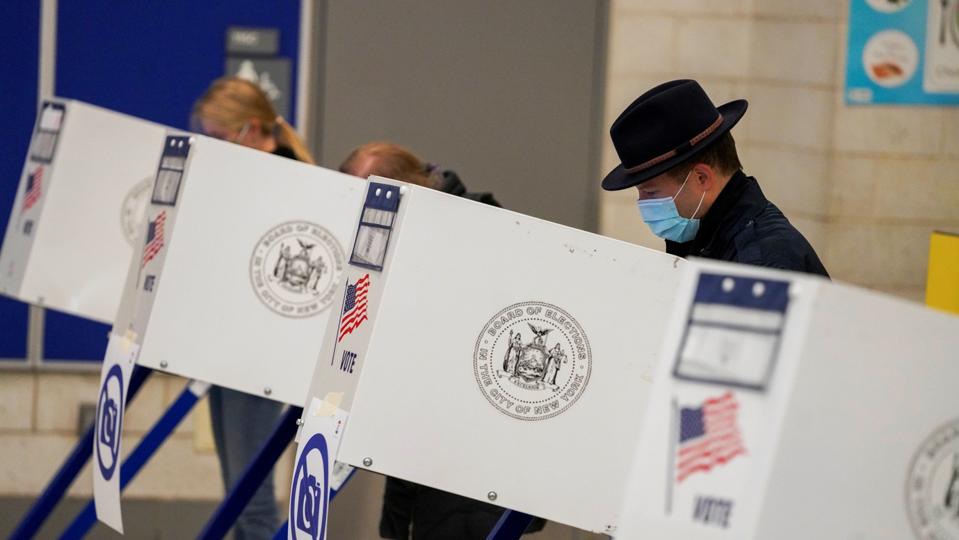Topline
Senate Republicans stopped the chamber from voting on the sweeping Freedom to Vote Act Wednesday, thwarting Democratic efforts to impose new voting reforms that could combat state-level restrictions being enacted by GOP lawmakers nationwide.

Key Facts
Republicans used the filibuster to block debate on the bill, with a 50-50 vote along party lines failing to reach the 60 vote threshold that Democrats would have needed to move forward with debate.
Senate Majority Leader Chuck Schumer switched his vote on moving forward with the bill from yes to no in order to bring the bill up for another vote under Senate procedural rules.
The Freedom to Vote Act would have imposed such measures as mandating early voting periods and no-excuse mail-in voting, making Election Day a holiday, restoring voting rights to the formerly incarcerated, limiting how long voting lines can be, prohibiting partisan gerrymandering, making it easier to register to vote, improving election infrastructure and enacting new campaign finance reform provisions.
In light of increased threats against election workers, the bill also would have made it harder to remove election officials on partisan grounds, and would have also protected against partisan election audits by taking steps to stop ballots from being mishandled by any third-party workers that might examine them.
President Joe Biden had urged lawmakers to let the bill move forward, saying in a statement released before the vote it was “unconscionable” for Republicans to block the bill and there’s an “urgent” need to address voting rights because “democracy—the very soul of America—is at stake.”
Chief Critics
Voting rights advocates condemned Republicans’ move to block the bill Wednesday, with Democratic Party-affiliated voting rights attorney Marc Elias likening the GOP lawmakers to “arsonists lighting the house of democracy on fire.” “The votes against the Freedom to Vote Act not only represent the monopolization of political power but threaten the security of our democracy and free and fair elections,” Stephanie L. Young, executive director of When We All Vote, said in a statement.
What To Watch For
Schumer said after the vote Wednesday he also intends to bring the John Lewis Voting Rights Act up for a vote in the Senate, potentially as soon as next week. That bill, which has already passed the House, would restore aspects of the Voting Rights Act that the U.S. Supreme Court weakened, like requiring the federal government to approve states’ proposed changes to their voting rules to ensure they’re not discriminatory.
What We Don’t Know
Whether the failure of the Freedom to Vote Act will be a catalyst for Democrats to abolish the filibuster and allow legislation to pass the Senate with a simple majority of votes. Sens. Joe Manchin (D-W.Va.) and Kyrsten Sinema (D-Ariz.) have been strongly opposed to getting rid of the filibuster, though Manchin helped draft the Freedom to Vote Act and has previously said “inaction” on voting rights legislation “is not an option.” Voting rights advocates and other Senate Democrats said Wednesday the bill’s failure bolsters the need to nix the filibuster, with Sen. Sheldon Whitehouse (D-R.I.) noting in a statement, “If the Republican blockade continues, we may need to restore Senate rules that allowed consideration of overwhelmingly popular bills like this one.”
Key Background
The Freedom to Vote Act marks the second major piece of voting rights legislation to be blocked in the Senate this term, after the similarly sweeping For the People Act was similarly blocked in June. The Freedom to Vote Act is a slimmed-down version of that bill, which Manchin spearheaded after joining with Senate Republicans to oppose the For the People Act. Democrats have ramped up their focus on voting rights in recent months to counter Republican state lawmakers, who responded to former President Donald Trump and his allies’ baseless allegations of fraud in the 2020 election by passing a slew of restrictive new voting bills in the name of “election integrity.” The Brennan Center for Justice reports 19 states have enacted 33 laws this year that restrict voting rights as of September 27, including in major battleground states like Texas, Florida, Georgia and Arizona.
Further Reading
The Freedom to Vote Act (Brennan Center for Justice)
Senate Republicans again block sweeping voting rights bill (The Guardian)







